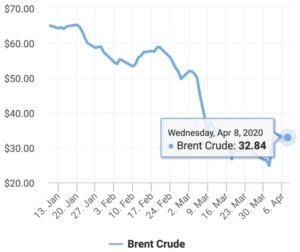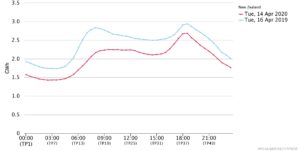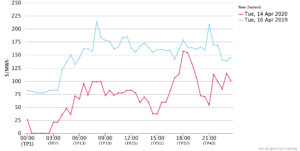The BusinessNZ Energy Council, a member of the World Energy Council, circulated a memo at the end of  March, which provided some insights on the impact of the COVID-19 pandemic on the global, and national, energy sector. Globally, as we all know, we have seen a marked drop in the price of crude oil due to plummeting demand related to lockdowns and travel restrictions. Standard Chartered has projected a 20% plunge in the demand for oil in 2020 from the world’s typical usage of 100 million barrels per day.
March, which provided some insights on the impact of the COVID-19 pandemic on the global, and national, energy sector. Globally, as we all know, we have seen a marked drop in the price of crude oil due to plummeting demand related to lockdowns and travel restrictions. Standard Chartered has projected a 20% plunge in the demand for oil in 2020 from the world’s typical usage of 100 million barrels per day.
We have yet to see what the real implications will be for New Zealand. However, the government has not deemed oil production an essential service. Nearly all of the roughly 25 to 30 thousand barrels per day are exported – and therefore not required for domestic energy security, so we can expect that to drop sharply. The major clients of the Marsden refinery, which includes the aviation industry that reduced to a near-halt, have negotiated an around 50% reduction in refining output for the next two months, so we can expect our crude oil imports, of around 105 thousand barrels per day, to also decrease by around 20% over 2020, similar to what is projected globally. Coal and natural gas production are deemed essential services and will continue. Nevertheless, in the case of gas, producers are planning for near-term disruptions as major users are curtailed. For example, the steel mill being shut down as a non-essential service, while the methanol production of Methanex has been scaled back.
As expected the electricity demand dropped immediately with the lockdown, and also changed our consumption profile. For a typical weekday, as shown in the graph below, the morning peak has disappeared, and the overall demand has dropped between 10 and 25%, or around 15% over a whole day. Weekends have seen a drop of around 8 to 10%. It does show that the scaling back of large electricity users amounts to around a 10% drop in demand, and that of other economic activities in the order of 5%. This is a significant change and reflected in the wholesale market price. The average daily price has reduced drastically, although the longer-term effects on the market, after the lockdown, remains to be seen.


The less demand, and lower prices, have also seen a decrease in thermal generation – gas, coal, and diesel/oil. The combined effect means a reduction in carbon emissions – from power generation – in the order of 1,500 tonnes per day. However, if it was maintained after the lockdown, this would only mean a reduction of less than 2% of the total annual emissions attributable to energy usage in the country. Of much greater significance will be our reduction in the use of transportation fuels, which account for nearly 50% of our energy-related emissions. If the projected reduction in oil imports do realise, that could mean a reduction in carbon emissions of around 10%; to levels last seen at the turn of the century. And, of course, carbon emission is but one metric of the environmental performance of the economy. For example, local air pollutions levels have dropped significantly since the start of the pandemic.
Changes in energy consumption, and especially the reduction in demand, do lead to socio-economic concerns. Some argue that this could be the tipping point for the oil and gas industry globally, with associated losses in employment. However, it may also offer us the opportunity, not to settle back into business-as-usual when the pandemic is under control, but to invest into cleaner energy alternatives. Indeed, New Zealand can embrace the situation and accelerate our just transition to a net zero carbon economy.
Professor Alan Brent holds the Chair in Sustainable Energy Systems at Victoria University of Wellington, and is a committee member of The Sustainability Society.

About The Author: Alan Brent
More posts by Alan Brent